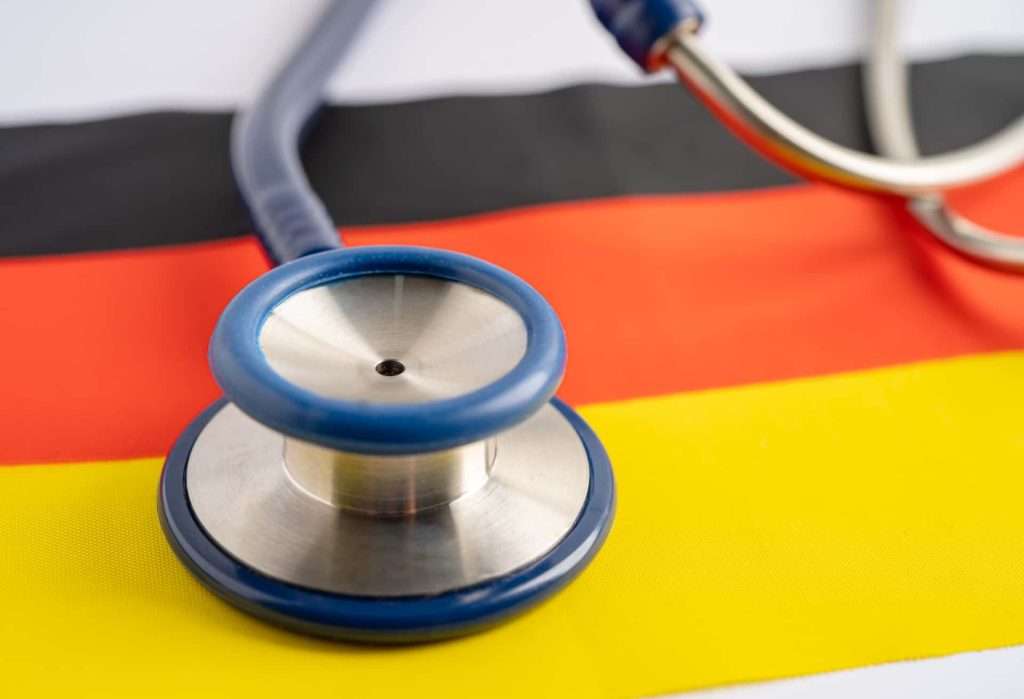
Do you ever feel like trying to figure out healthcare in Germany is a bit like being dropped into the middle of a gripping ‘Krimi’ novel—minus the thrilling soundtrack?
If you’re stepping into the realm of healthcare in Germany, you might find it’s less Wagnerian opera and more a complex S-Bahn network during rush hour.
So, you’re in the land of precision engineering and punctual trains, but does the healthcare system tick with the same legendary German clockwork?
The answer isn’t as simple as “ja” or “nein.”
But fear not! While it may not come with an instruction manual in 12 languages, I’m here to translate the often-cryptic cues of this world-class health juggernaut. Did you know, for instance, that Germany has one of the highest densities of physicians in the world but finding your ‘Hausarzt’ (GP) could still feel like a quest for the Holy Grail?
Before you frantically Google translate your symptoms, let’s unpack my 7 top tips for mastering healthcare in Germany.
We’ll cut through the medical jargon, sidestep the administrative ‘Ach du lieber!’ moments, and give you the lowdown on how to swerve the common ‘Faux pas’ of the uninitiated.
Overview of the German Healthcare System
Germany’s healthcare system is universally admired for its efficiency and the quality of care provided. At its core, it operates on a two-tier system: public (statutory) and private health insurance. Here’s a quick look at how these two pillars stand:
| Public Health Insurance (Gesetzliche Krankenversicherung – GKV) | Private Health Insurance (Private Krankenversicherung – PKV) |
| Coverage for the majority of the population. | An option for those with higher incomes or self-employed. |
| Premiums are based on income (around 14.6% plus a possible additional contribution rate that varies by the sickness fund, shared equally by employer and employee). | Premiums are based on risk factors, including age and health status. |
| Access to a wide network of doctors and hospitals. | Access to a broader range of services and possibly shorter waiting times for appointments. |
| Freedom to choose among many different sickness funds. | Option to opt for exclusive doctors and clinics, often with more luxurious amenities. |
| Most services require a small co-payment. | Some plans cover all healthcare costs without co-payments. |

Compulsory Health Insurance for Residents
- All residents in Germany are required by law to have health insurance, whether through public or private schemes.
- Employees earning under a certain threshold (2023: €64,350 annually) are automatically enrolled in public health insurance.
- Self-employed individuals, students, and those with higher incomes can choose between public and private insurance.
- Even unemployed residents covered by social security receive health insurance through public funds.
The hallmark of healthcare in Germany is the high quality of facilities and medical staff. German hospitals are well-equipped, and the nation is known for having a high doctor-to-patient ratio, ensuring accessible and comprehensive care. Furthermore, ongoing investment in medical research and technology keeps healthcare in Germany at the forefront of innovation and excellence.
Check this out: Lost in Translation When Speaking in German: Why Do Language Mishaps Happen?
7 Tips to Navigate Healthcare in Germany
Healthcare in Germany is quite advanced, efficient, quick and thorough, like most things in the country. It is easy to get lost in the same, so here are our tried and tested tips:
Tip #1: Understand Your Insurance Options
Understanding healthcare in Germany starts with a fundamental choice: opting for public (Gesetzliche Krankenversicherung – GKV) or private insurance (Private Krankenversicherung – PKV). Here’s a breakdown to help you understand your options:
Public Insurance (GKV)
- Eligibility: Mandatory for employees making less than €64,350 per year (as of 2023). Also available to freelancers and self-employed individuals who opt in.
- Coverage: A broad catalogue of services, from general doctor visits to hospital stays and basic dental care. Prescriptions, physical therapy, and maternity care are typically included.
- Choosing GKV: Ideal for those who prefer a straightforward, income-based premium and seek wide-ranging coverage.
Private Insurance (PKV)
- Eligibility: Open to those earning above the income threshold, civil servants, self-employed individuals, and freelancers.
- Coverage: Offers varying levels of care, from basic to comprehensive. It often includes perks like private hospital rooms and alternative treatments.
- Choosing PKV: Best for those who want more personalized healthcare options and are comfortable with a premium based on individual risk factors, not income.
Check this out: Transportation in Berlin: 10 Tips For When You Are Lost in the City
Tip #2: Register with a General Practitioner
In Germany, establishing a relationship with a ‘Hausarzt’ (general practitioner or GP) is a cornerstone of effective healthcare management. This primary doctor acts as your healthcare navigator and first point of contact.
Importance of a Hausarzt
- Serves as your healthcare advocate and understands your medical history.
- Offers initial consultations and treatments for various ailments.
- Coordinates your overall care and referrals to specialists when necessary.
Finding and Registering with a GP
- Locate a GP through friends’ recommendations, online directories, or the Kassenärztliche Vereinigung (Association of Statutory Health Insurance Physicians) website.
- Once you’ve chosen a GP, registration is usually as simple as making an appointment and providing your health insurance details.
Role of the GP
- Referrals: GPs provide referrals to specialists, which are often necessary for treatment coverage by your health insurance.
- Treatment Continuity: They maintain your medical records, ensuring continuity of care and preventing redundant testing or treatment.

Tip #3: Know How to Access Specialist Care
Accessing healthcare in Germany requires navigating the referral system, especially under public health insurance. Typically, you must first see your Hausarzt, who will assess your need and write a referral to a specialist (Facharzt). With private insurance, you often have the flexibility to directly make appointments with specialists without needing a referral, saving you time.
Scheduling Appointments When Accessing Healthcare in Germany
- Making an Appointment: Call the specialist’s office or use online portals; some specialists may require a referral number from your GP.
- Wait Times: Expect varied wait times depending on the specialty and urgency; non-urgent specialist visits can have longer waits, sometimes several weeks.
- Urgent Care: For urgent issues, university hospitals (Unikliniken) often have specialist clinics that offer walk-in hours.
Tip #4: Get Familiar with the Hospital System
The system of healthcare in Germany is diverse, with distinct differences between public and private facilities, and various treatment options. Here’s a snapshot to help you understand what to expect:
Differences Between Public and Private Healthcare in Germany:
| Public Hospitals | Private Hospitals |
| Typically larger, serving a broad community. | Often smaller with a focus on personalized care. |
| Financed by public health insurance funds and government. | Funded by private health insurance and out-of-pocket payments. |
| Patients usually share rooms. | More likely to offer private rooms. |

Emergency Services and Notaufnahme (Emergency Room)
- Access: Open 24/7, available to anyone in need, regardless of insurance type.
- Emergency Hotline: Dial 112 for immediate medical assistance or healthcare in Germany.
- Triage System: Patients are prioritized based on the severity of their conditions.
You might be interested in this: Struggling with German? Here Is Our Awesome Guide to Mastering German Vocabulary
Tip #5: Navigate the Pharmacy and Prescription Process
Understanding how to obtain and fill your prescriptions, known as ‘Rezepte‘, is crucial in the system of healthcare in Germany. Here’s a straightforward guide to managing your medication needs:
Getting Prescriptions from Your Doctor
After a consultation, your doctor will issue a prescription for the necessary medication.
Prescriptions are typically electronic; you’ll receive a paper copy with a barcode, or you can send it directly to a pharmacy of your choice.
The Role of Apotheken (Pharmacies) and Their Services:
- Dispensing Medication: Present your prescription at any Apotheke to receive your medication. Over-the-counter options are also available for minor ailments.
- Pharmaceutical Advice: Pharmacists provide expert advice on medication usage, side effects, and interactions.
- Additional Services: Many pharmacies offer blood pressure monitoring, vaccinations, and small medical aids.
Apotheken are easily accessible in German cities and towns, ensuring that patients can readily obtain prescribed medications and professional healthcare advice.
Tip #6: Understand the Payment and Reimbursement Process
Navigating the financial aspects of healthcare is key to managing your healthcare in Germany without unexpected expenses. Here’s what you need to know about co-pays, billing, and reimbursements:
Co-pays and Billing: What to Expect
- With public insurance, you’ll encounter co-pays for certain services, like a standard €10 fee for prescriptions, and a hospital daily charge for inpatient stays.
- Private insurance typically covers a higher percentage of costs, sometimes even full reimbursement, depending on your plan.

How Reimbursement Works
- Public Insurance: Bills are sent directly to your insurer, and you pay any nominal co-pays at the time of service.
- Private Insurance: You pay upfront for services, submit bills to your insurance, and then receive reimbursement based on your policy terms.
Tips for Keeping Track of Medical Expenses and Paperwork
- Save All Receipts: Always keep receipts and paperwork for services paid out-of-pocket.
- Organize Documents: File your medical documents by date and type of service for easy reference.
- Use Apps: Consider using health insurance apps for submitting reimbursement documents digitally.
- Know Your Policy: Be aware of your insurance plan details, including coverage limits and claim submission deadlines.
Read more: 7 Tried and Tested Tips For Students to Find Part-Time Jobs in Germany
Tip #7: Learn the Language Basics
When living in Germany, a basic grasp of German medical terms can be invaluable for navigating healthcare scenarios.
Knowledge of terms helps in accurately describing symptoms and understanding prescriptions or instructions from healthcare professionals.
While many doctors speak English, especially in urban areas, nurses and administrative staff may not. Basic German improves communication, helps in emergency situations, and access better healthcare in Germany.
Using Translation Services and Resources
- Medical Dictionaries: Keep a German-English medical dictionary or app handy.
- Translation Apps: Use translation apps for live conversations if you’re stuck.
- Language Courses: Consider taking a basic medical German course to familiarize yourself with common phrases and terminology.

Mastering the Healthcare Maze in Germany
In summary, understanding the intricacies of healthcare in Germany can initially seem like a complex maze. However, with these seven essential tips — from grasping your insurance options to mastering basic medical German — you can confidently navigate the system.
Remember that being proactive about your healthcare, such as registering with a general practitioner and understanding the payment processes, will set you up for a smoother experience. The high-quality and efficient healthcare in Germany is designed to support you, but it requires some personal navigation.
As you apply these insights to your healthcare journey in Germany, take comfort in knowing that you are operating within one of the world’s most advanced and comprehensive systems.




